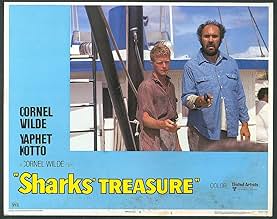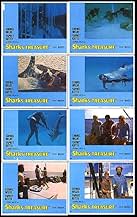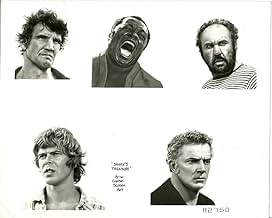IMDb RATING
4.7/10
519
YOUR RATING
An aging fisherman finds a sunken treasure in shark-infested waters and is attacked by five escaping convicts.An aging fisherman finds a sunken treasure in shark-infested waters and is attacked by five escaping convicts.An aging fisherman finds a sunken treasure in shark-infested waters and is attacked by five escaping convicts.
John Nealson
- Ron
- (as John Neilson)
Roxanna Bonilla-Giannini
- Linda
- (as Roxanna Bonilla)
- Director
- Writer
- All cast & crew
- Production, box office & more at IMDbPro
Featured reviews
Let's start with a round of applause for Cornel Wilde; - that's the least of recognition he deserves for all the work and effort he put into his one-man-show "Shark's Treasure". Wilde wrote, produced and directed the film, and he also plays the lead role of boat captain/treasure hunter Jim Carnahan. And he did all this just to prove that he still looks fit and mighty hunky in his naked torso at the age of 65!
Seriously, at several moments throughout the movie, I had the impression that "Shark's Treasure" secretively was a film for gay men that hadn't outed themselves yet. There's one woman in the cast and she appears only briefly, while most of the film's padding footage exists of the four lead stars parading around the deck bare-chested and in their tight Speedos. Ideally for married men still in the closet. "What are you watching, honey? Oh, just a macho flick about treasure hunting at sea, dear". Unfortunately, the adventure-part of "Shark's Treasure" is quite disappointing. Captain Jim and his crew are peacefully diving up ancient valuable coins off the coast of Honduras, but then become hijacked by a group of escaped convicts that naturally want to confiscate their loot. Admittedly the underwater footage is beautiful, but the pacing is incredibly slow, the film is far too long and it's a little too obvious that the shark footage is either shot at a different location or borrowed from other movies/documentaries.
Seriously, at several moments throughout the movie, I had the impression that "Shark's Treasure" secretively was a film for gay men that hadn't outed themselves yet. There's one woman in the cast and she appears only briefly, while most of the film's padding footage exists of the four lead stars parading around the deck bare-chested and in their tight Speedos. Ideally for married men still in the closet. "What are you watching, honey? Oh, just a macho flick about treasure hunting at sea, dear". Unfortunately, the adventure-part of "Shark's Treasure" is quite disappointing. Captain Jim and his crew are peacefully diving up ancient valuable coins off the coast of Honduras, but then become hijacked by a group of escaped convicts that naturally want to confiscate their loot. Admittedly the underwater footage is beautiful, but the pacing is incredibly slow, the film is far too long and it's a little too obvious that the shark footage is either shot at a different location or borrowed from other movies/documentaries.
Shipowner Cornell Wilde and some youngsters go in search of sunken Spanish treasure. Along the way they encounter sharks and pirates.
Cornell Wilde wrote, directed and starred in this loosely plotted modern adventure story, along with Yaphet Koto and a couple of youngsters. There's as much underwater photography -- a bit faded in the print I saw -- as story, and as much character exposition as gold.
Wilde had spent the 1950s as a dashing but minor action hero. Born in Hungary in 1912, he came to the US four years later. After a few uncredited bits in the 1930s, his break came in HIGH SIERRA, and he spent the next 20 years playing in a mix of costume dramas and more modern fare; he was one of the movies' better swordsmen, and was reputed to have turned down a slot in the American fencing team at the 1936 Olympics. His career slowed down in the 1960s, but some television guest shots and a few kept him reasonably active until shortly before his death in 1989.
Cornell Wilde wrote, directed and starred in this loosely plotted modern adventure story, along with Yaphet Koto and a couple of youngsters. There's as much underwater photography -- a bit faded in the print I saw -- as story, and as much character exposition as gold.
Wilde had spent the 1950s as a dashing but minor action hero. Born in Hungary in 1912, he came to the US four years later. After a few uncredited bits in the 1930s, his break came in HIGH SIERRA, and he spent the next 20 years playing in a mix of costume dramas and more modern fare; he was one of the movies' better swordsmen, and was reputed to have turned down a slot in the American fencing team at the 1936 Olympics. His career slowed down in the 1960s, but some television guest shots and a few kept him reasonably active until shortly before his death in 1989.
Okay, a few things. First, the biggest problem with the movie seems to be its editing. Like a freshman essay, there are clearly parts that drag because they're nothing but obvious padding. Who knows how much footage Cornel Wilde -- who wrote, directed, and stars in this movie -- shot that ended up being badly assembled later. This is obvious because on a shot for shot level, the film is not incompetent. It's the patchwork assembly that makes it struggle.
Beneath that baroque mess is a fairly conventional plot. A ragtag group of treasure hunters goes looking for gold in open waters while a group of escaped convicts stand in essentially for pirates. There's the usual tough captain and tense grousing among the crew until the male bonding kicks in. This is also a movie where old fashioned masculinity is on display. Despite what a lot of seemingly young viewers might think about a gay subtext, it was pretty common among tough guys (or the ones playing them onscreen) to exhibit themselves, one part of out narcissism and one part out of intimidation. Sure, it's comical by today's standards, but it was taken more seriously in the 50s, 60s, and even parts of the 70s depending on generation.
That leads to the violence, too. We get to see not just the human stuff, tedious as it is, but more than a few sharks and other fish killed in sometimes brutal ways. It may happen in real life, but it just seems gratuitous here to demonstrate another silly masculine trope that killing something minding its own business somehow makes someone a man. The characterizations follow suit. Wilde's captain comes across as an overbearing nut, but if you know anything about his generation and pay attention to the script, it's mostly an act. For instance, his seemingly psychopathic need to control cigarettes aboard his ship is supposed to -- wink, wink -- show he really cares about his crew, as one of them, indeed, quits without initially realizing it.
In the end, the movie is a mess but not merely as much as some might think. It's competently if not imaginatively acted and directed, and while the recycled music makes for a patchwork score, there are a few moments where everything actually works. For the mid-1970s, that alone is remarkable given that Hollywood couldn't figure out if it wanted to make traditional movies or imitations of the low budget films the French, Italians, and Japanese had made in the 50s and 60s.
Beneath that baroque mess is a fairly conventional plot. A ragtag group of treasure hunters goes looking for gold in open waters while a group of escaped convicts stand in essentially for pirates. There's the usual tough captain and tense grousing among the crew until the male bonding kicks in. This is also a movie where old fashioned masculinity is on display. Despite what a lot of seemingly young viewers might think about a gay subtext, it was pretty common among tough guys (or the ones playing them onscreen) to exhibit themselves, one part of out narcissism and one part out of intimidation. Sure, it's comical by today's standards, but it was taken more seriously in the 50s, 60s, and even parts of the 70s depending on generation.
That leads to the violence, too. We get to see not just the human stuff, tedious as it is, but more than a few sharks and other fish killed in sometimes brutal ways. It may happen in real life, but it just seems gratuitous here to demonstrate another silly masculine trope that killing something minding its own business somehow makes someone a man. The characterizations follow suit. Wilde's captain comes across as an overbearing nut, but if you know anything about his generation and pay attention to the script, it's mostly an act. For instance, his seemingly psychopathic need to control cigarettes aboard his ship is supposed to -- wink, wink -- show he really cares about his crew, as one of them, indeed, quits without initially realizing it.
In the end, the movie is a mess but not merely as much as some might think. It's competently if not imaginatively acted and directed, and while the recycled music makes for a patchwork score, there are a few moments where everything actually works. For the mid-1970s, that alone is remarkable given that Hollywood couldn't figure out if it wanted to make traditional movies or imitations of the low budget films the French, Italians, and Japanese had made in the 50s and 60s.
The story of SHARKS' TREASURE is simple enough: four guys look for sunken treasure in the Caribbean sea. They have fun and the occasional quarrels while looking for the treasure. Midway into the movie, a bunch of escape cons (or pirates) hijack the boat and its crew and forces the foursome to continue on with the search while they eat their food and hide on the boat. Eventually, the original crew makes a pack with one of the ex-cons and they escape and a cat & mouse chase occurs on a nearby island.
SHARKS' TREASURE is not a great film by any means. But it's not a bad film too. It's hopelessly average. The direction, by Cornel Wilde, is competent, with some nice camera-work here and there but it's really uninspired and looks like a TV movie of sorts for most of the film, until the climax at the beach which was well made: we see the men trying to escape the gang of ex-cons with just the sound and image of the roaring waves crashing on the beach. No music. Nice.
The big problem with the film is the limited space of the boat and the really corny acting by Cornel Wilde. The acting by everyone else was good, with Yaphet being the stand-out here but Cornel's acting belongs in the 1950s, not a film made in the gritty 1970s. He stood out more often than not as a sore thumb. To make things more annoying, Cornel (the director/actor) filmed himself prominently, really wanting to impress god knows who that he was still in great shape at his then old age. Fortunately, the film never becomes a total vanity project for Cornel but it sure comes close to it. And the other annoying thing about the film was the song. It's probably the worst song I've ever heard in any film. Extremely corny. The ending is also corny: after everything they went through, you'd think they wouldn't go back looking for the treasure. Aside for those weak points, the film was OK.
I watched SHARKS' TREASURE on a specialty satellite channel from beginning to end without changing channels, which should tell you that it held my attention for 90 minutes, which is more than I can say with majority of movies I watch.
SHARKS' TREASURE is not a great film by any means. But it's not a bad film too. It's hopelessly average. The direction, by Cornel Wilde, is competent, with some nice camera-work here and there but it's really uninspired and looks like a TV movie of sorts for most of the film, until the climax at the beach which was well made: we see the men trying to escape the gang of ex-cons with just the sound and image of the roaring waves crashing on the beach. No music. Nice.
The big problem with the film is the limited space of the boat and the really corny acting by Cornel Wilde. The acting by everyone else was good, with Yaphet being the stand-out here but Cornel's acting belongs in the 1950s, not a film made in the gritty 1970s. He stood out more often than not as a sore thumb. To make things more annoying, Cornel (the director/actor) filmed himself prominently, really wanting to impress god knows who that he was still in great shape at his then old age. Fortunately, the film never becomes a total vanity project for Cornel but it sure comes close to it. And the other annoying thing about the film was the song. It's probably the worst song I've ever heard in any film. Extremely corny. The ending is also corny: after everything they went through, you'd think they wouldn't go back looking for the treasure. Aside for those weak points, the film was OK.
I watched SHARKS' TREASURE on a specialty satellite channel from beginning to end without changing channels, which should tell you that it held my attention for 90 minutes, which is more than I can say with majority of movies I watch.
In his later years Cornel Wilde did a number of films on his own as his day as a box office draw had long gone. Stuff like Beach Red and The Naked Prey were interesting. Sharks' Treasure was quite a bit less in quality than those others were.
Wilde here is a charter boat captain no doubt giving three hour tours like the Skipper and Gilligan did on the USS Minow. Young surfer kid John Neilson brings an old Spanish gold doubloon and he knows where there might be more on the Mexican coast.
Wilde and Neilson take on Yaphett Kotto and David Canary as crew and the four set out for the spot that Neilson says the treasure was found. The four do some considerable diving and then have the misfortune to run across a group of escaped convicts led by Lobo as played by Cliff Osmond who certainly justified his name.
One of the convicts is David Gilliam who looks a lot like Neilson, blond and pretty and Osmond's personal boy toy from prison. Osmond's weakness is Gilliam and Neilson is no doubt grateful Gilliam's around otherwise these guys who haven't seen any female companionship would zero in on him. It all proves their undoing.
The underwater sequences are nice and the sharks as a dangerous as those in the various Jaws films. And the guys are all walking around in various states of undress which no doubt titillated the women and gay men in the audience. Cornel Wilde certainly looked in good shape for a guy in his sixties.
Sharks' Treasure is your routine action film, other than the underwater sequences and the well put together men, nothing more.
Wilde here is a charter boat captain no doubt giving three hour tours like the Skipper and Gilligan did on the USS Minow. Young surfer kid John Neilson brings an old Spanish gold doubloon and he knows where there might be more on the Mexican coast.
Wilde and Neilson take on Yaphett Kotto and David Canary as crew and the four set out for the spot that Neilson says the treasure was found. The four do some considerable diving and then have the misfortune to run across a group of escaped convicts led by Lobo as played by Cliff Osmond who certainly justified his name.
One of the convicts is David Gilliam who looks a lot like Neilson, blond and pretty and Osmond's personal boy toy from prison. Osmond's weakness is Gilliam and Neilson is no doubt grateful Gilliam's around otherwise these guys who haven't seen any female companionship would zero in on him. It all proves their undoing.
The underwater sequences are nice and the sharks as a dangerous as those in the various Jaws films. And the guys are all walking around in various states of undress which no doubt titillated the women and gay men in the audience. Cornel Wilde certainly looked in good shape for a guy in his sixties.
Sharks' Treasure is your routine action film, other than the underwater sequences and the well put together men, nothing more.
Did you know
- TriviaThe opening theme song "Money, Money" was written by writer/director/star Cornel Wilde and sung by British musician Ken Barrie.
- Quotes
Ron Walker: What happened to all that loot you found before?
Jim Carnahan: I blew it on my wardrobe.
- ConnectionsFeatured in 42nd Street Forever, Volume 3: Exploitation Explosion (2008)
- How long is Sharks' Treasure?Powered by Alexa
Details
- Release date
- Country of origin
- Language
- Also known as
- Sharks' Treasure
- Filming locations
- Coral Sea, South Pacific, Pacific Ocean(Shark Sequences)
- Production company
- See more company credits at IMDbPro
Box office
- Gross US & Canada
- $2,000,000
Contribute to this page
Suggest an edit or add missing content






















